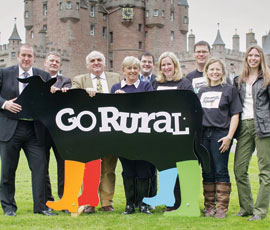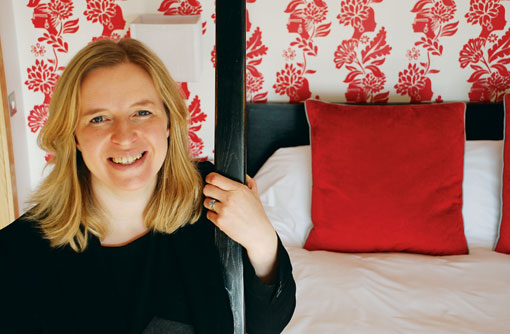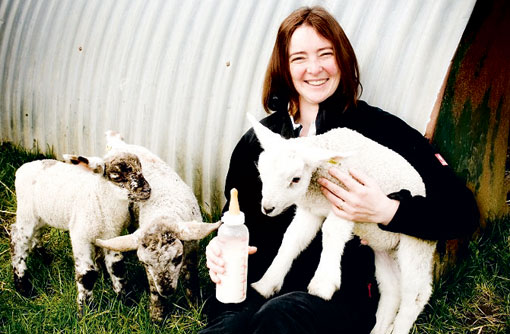Scotland tells tourists to ‘GoRural’

Britain is back to enjoying “all things British”. It’s not just because of the Jubilee and the Olympics; the resurgent interest in British food, heritage and holidays has been helped by an array of TV programmes such as Coast, Countryfile and Lost Routes.
One of the biggest beneficiaries has been domestic tourism. The UK rural tourism sector generates £14bn every year and for some regions, such as Yorkshire, Scotland and Cumbria, it is a fundamental part of the local economy. What’s more, it’s growing.
In 2011, the rural tourism share from UK overnight visitors was £628m compared with an average of £544m between 2006 and 2010. The Scottish government also sees future economic growth from food, drink, tourism and renewable energy.
Tapping into consumers’ growing rural tendencies is at the core of a new initiative launched this summer called GoRural. It aims to increase footfall for Scotland’s vibrant rural tourism sector as well as encouraging collaboration between the rural businesses that are its members.
GoRural aims to encourage Edinburgh residents and visitors to take day trips and short breaks to countryside areas within 90 minutes of the city boundary. The plan is also to replicate GoRural in Aberdeen, Dundee, Glasgow and Inverness over the next 12-18 months.
“GoRural is an exciting window into Scotland’s countryside and a perfect way to stimulate real impetus into encouraging footfall out of the cities. There is such diversity in rural Scotland’s visitor activities and attractions, as well as in our specialist farm food producers, all of which make a very compelling case to venture out of the city boundaries.”
Nigel Miller, NFU Scotland president
The project started life during the 2011-12 Scottish Enterprise Rural Leadership Programme, where its three founding directors – Caroline Millar, Martyn Steedman and Jane Craigie – met. Since then, GoRural has been awarded VisitScotland and Scottish Enterprise grants totalling £48,000 – £10,000 of which is targeted at training the member businesses.
Nigel Miller, president of NFU Scotland, one of GoRural’s project partners, added: “GoRural is an exciting window into Scotland’s countryside and a perfect way to stimulate real impetus into encouraging footfall out of the cities. There is such diversity in rural Scotland’s visitor activities and attractions, as well as in our specialist farm food producers, all of which make a very compelling case to venture out of the city boundaries.
“Over the past few years, fantastic diversified farm and rural businesses have opened up to visitors. There is a genuine focus on providing a great experience and developing unique local features and skills.
GoRural is the next stage; adding value by building a collaborative network of attractions and providing an instant information pathway for visitors.”
A number of partners have come on board to help get the project off its feet, including NFU Scotland, VisitScotland, Scottish Enterprise, Scottish Land & Estates, Angus Council and the Association of Scotland’s Self Caterers.
Mike Cantlay, chairman of VisitScotland, said: “Scotland’s countryside has so much to offer, from stunning scenery to fantastic food and drink, and we are seeing a number of rural businesses diversifying into tourism, including offering off-road tours and converting former steading buildings into luxury bed and breakfasts.
“Next year is the Year of Natural Scotland, which will enhance our country’s reputation as a place of outstanding natural beauty. By working together and offering quality visitor experiences, it is clear that rural tourism will continue to play a major role in Scotland’s visitor economy.”
Agri-tourism around the world

Caroline Millar and her husband Ross run The Hideaway Experience – a 5-star retreat on the family farm at Auchterhouse near Dundee. They have three high-quality, boutique “hideaways” aimed at giving couples time for privacy, intimacy and little bit of decadence. This tourism business has given Ross and Caroline another income stream, which generates 50% of the farm’s turnover and a healthy profit while using just 0.75 acres of land.
Caroline is a driving force for championing quality, collaboration and professionalism in the Scottish rural tourism sector and is one of the co-founders of GoRural.
She has just started her travels as a 2012 Nuffield Scholar to look specifically at “agri-tourism” – essentially, tourism on working farms. Her aim is to bring her findings back to the UK to help improve the business operating environment for rural tourism businesses.
“Political recognition of the importance of agri-tourism has been apparent in the UK and it’s good news, but we are woefully behind some other parts of the world,” she says.
In Italy, parts of the USA, India, Japan, Norway, Austria, South Africa, Australia and New Zealand, agri-tourism is championed by travellers, and in many instances by policy makers. In Italy there is strong political support for “agriturismos”, which Caroline has discovered on the first leg of her Nuffield tour in Tuscany.
“Agri-tourism businesses, called agriturismos, are fundamental to the Italian government’s policy on linking consumers to food,” she explains. “All Italian tourism businesses must have a licence to operate, but agriturismos need an additional licence – only awarded if they are also a working farm. Under this licence, the owner can earn up to three quality stars – the first two are for the quality of the facilities and service, but the third can only be attained if the owner has a qualification in agriculture, horticulture or agronomy, is a bona-fide farmer and has passed a test on their ability to teach visitors about their farm practices, the countryside and food production.”
Agriturismos also have valuable tax breaks. If the business earns more than €100,000 from agri-tourism, the first €66,000 is tax-free. Caroline believes the UK can learn a lot from the scheme.
“Licensing ensures consistent quality of tourism businesses, encourages consumer learning and the tax incentives create opportunities for farmers to diversify. It also gives a new business opportunity for a farm’s next generation, just as The Hideaways have done for Ross and me.”
www.thehideawayexperience.co.uk
Running a successful farm shop and cafe

Husband and wife team John and Kirsteen Sinclair and their children Sophie (15) and George (14) run West Craigie Farm, on the outskirts of Edinburgh. It is a 106ha tenanted arable and fruit farm on the Dalmeny Estate with a very successful farm shop and café. John is currently the Scottish council member of FARMA (National Farmers’ Retail & Markets Association) and a director of the Royal Highland Agricultural Show Society.
The Sinclairs have had a farm shop since 1988. “However it was very informal in the early days; if we were there, the customer got served, if not, tough luck!” John quips. “When Kirsteen started taking our jams and fruit to the farmers market in 1999, we saw quickly that there was a real interest in the provenance of food. We opened Craigie’s shop and café in 2007 and it has now doubled in size.”
As tenant farmers, raising capital for their farm shop was a challenge. “We sold off our machinery to finance the original build (£250,000), which was done with about £10,000 of Farm Business Development Scheme money. The extension in 2009 cost another £250,000 for which we were lucky to get 50% funding from the Scottish Rural Development Programme.” The annual turnover of the farm shop and café is now £1.3m, and for the farm, £250,000.
Their selling points are close-to-city location, focus on their own fresh produce and home-cooked food. “We have a lot of simple activities for amusing families – a play park, nature trail and farm animals. I am also committed to educating people about where their food comes from. We host about 20 school visits a year organised through the Royal Highland Education Trust. This year we also donated four allotments to local schools, together with advice and support. They decide what they grow and what market they are going for.”
www.craigies.co.uk
| Diversification do’s and don’ts | |
|---|---|
| Do | Don’t |
| Get proper financial disciplines in place from day one. It can be hard to budget for the unknown but it is so important to know if you are heading the wrong way. | Work seven days a week. Get away from the business to give you time to think and plan. If the business can’t operate without you, you really must question if you should be doing it at all. |
| Join an organisation such as FARMA and go to their events so that you can network with those who have already made the mistakes. | Let anyone hold a gun to your head. If a member of staff threatens to leave, I would reach for the door and open it for them. No one is irreplaceable. |
| Go for grant funding. You are bringing lots of employment to the countryside so you deserve every penny and more. | Think it will get you rich quick. If it was that easy, everyone would be doing it. |
| Give responsibility to others. They might do things differently but they might also do it better. | Undersell yourself. If only 5% of your customers complain that you are too expensive, you are probably under pricing. |
| Know the margin you need and stick to it. Everything we sell is based on price points of 25p, 49p, 75p or 99p. We calculate our required margin and work to the nearest price point. | |
Tourism is not the only diversification option open to farmers. One Exmoor farm turned to writing to bring in extra money. Read Victoria Eveleigh’s story of her diversification with a difference.
